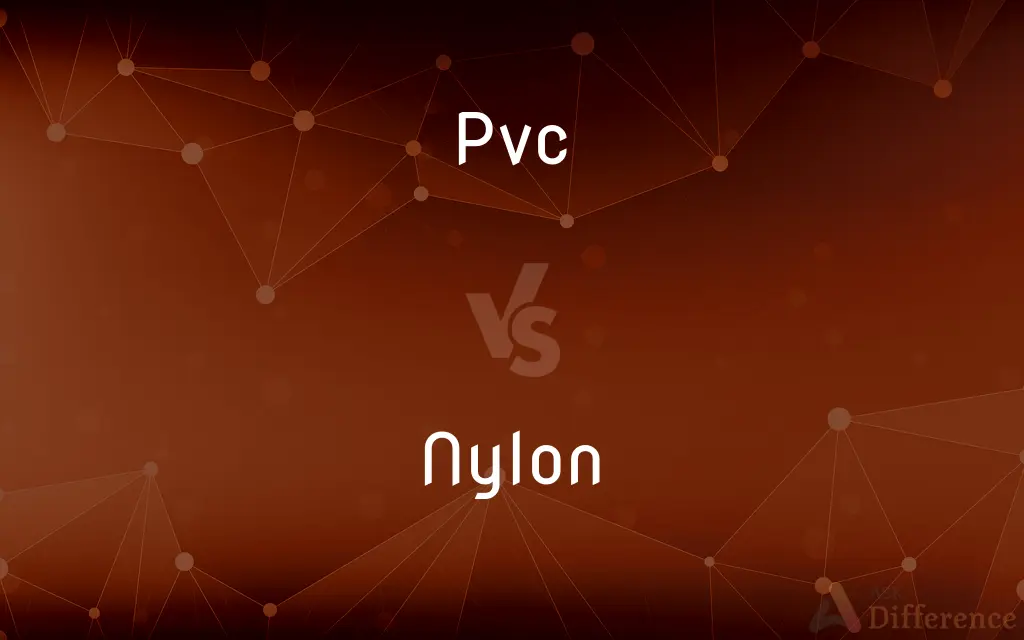Pvc vs. Nylon — What's the Difference?
By Tayyaba Rehman & Maham Liaqat — Updated on March 30, 2024
PVC is durable, synthetic plastic polymer used in construction, known for its strength and chemical resistance. Nylon is synthetic polymer, specifically a type of polyamide, renowned for its flexibility, toughness, and resistance to wear and tear.

Difference Between Pvc and Nylon
Table of Contents
ADVERTISEMENT
Key Differences
PVC, or polyvinyl chloride, is a versatile plastic used in a wide range of products, from plumbing pipes and vinyl flooring to electrical cable insulation. Its popularity stems from its chemical stability, low cost, and durability. PVC can be made more flexible and soft through the addition of plasticizers. On the other hand, Nylon is a synthetic polymer family, known for being the first commercially successful synthetic thermoplastic polymer. It's celebrated for its strength, elasticity, and resistance to abrasion and chemicals, making it ideal for use in clothing, ropes, and automotive and mechanical parts.
PVC's rigidity and resistance to chemicals and weather make it a preferred choice for outdoor and construction applications. It's also fire-resistant, which adds to its utility in building materials. Whereas Nylon's flexibility and toughness make it suitable for applications where a combination of strength, lightweight, and flexibility is required, such as in sportswear, automotive components, and consumer goods.
While PVC is often criticized for environmental concerns, especially regarding its production and disposal, which can release harmful chlorides and dioxins, Nylon faces challenges related to sustainability, as its production involves petrochemicals, and it is not biodegradable. However, recycling and more sustainable manufacturing practices are being developed for both materials.
PVC and Nylon differ significantly in their handling of temperature and wear. PVC tends to become brittle at low temperatures, whereas Nylon retains its toughness and flexibility even in cold environments. Nylon also generally exhibits better wear resistance and lower friction properties than PVC, making it more suitable for moving parts in machinery.
Both PVC and Nylon are waterproof, which makes them popular in various applications. PVC's waterproof nature is beneficial for pipes and outdoor construction materials, while Nylon's quick-drying and water-resistant properties are valued in clothing and outdoor gear.
ADVERTISEMENT
Comparison Chart
Composition
Synthetic plastic polymer
Synthetic polyamide polymer
Key Properties
Durable, chemical-resistant, can be rigid or flexible
Tough, elastic, abrasion-resistant, chemically resistant
Common Uses
Plumbing pipes, vinyl flooring, cable insulation
Textiles, automotive parts, ropes
Environmental Impact
Production and disposal concerns due to chlorides and dioxins
Non-biodegradable, petrochemical-based production
Temperature Handling
Becomes brittle in cold temperatures
Retains flexibility and toughness in cold
Wear Resistance
Moderate, varies with plasticizers
High, suitable for parts with repeated use
Waterproof
Yes, used in outdoor and construction materials
Yes, valued in clothing and outdoor gear
Compare with Definitions
Pvc
Can be made flexible with plasticizers, expanding its use.
Flexible PVC is used in medical tubing and blood bags.
Nylon
A synthetic polyamide with high strength and elasticity.
Nylon fibers are extensively used in making durable clothing.
Pvc
Environmental concerns arise from its production and disposal.
Disposing of PVC can release harmful dioxins.
Nylon
Exhibits excellent wear resistance, suitable for mechanical parts.
Nylon gears are used in machinery for their durability.
Pvc
A versatile plastic polymer used widely in construction for its durability.
PVC pipes are a staple in residential plumbing.
Nylon
Maintains toughness in cold, benefiting outdoor applications.
Nylon is preferred for winter sports gear.
Pvc
Known for its chemical resistance, ideal for industrial applications.
PVC is used in chemical handling equipment.
Nylon
Quick-drying and water-resistant, ideal for outdoor wear.
Nylon jackets are popular for their lightweight and water resistance.
Pvc
Fire-resistant, making it safe for electrical insulation.
PVC cable insulation is common in household wiring.
Nylon
Faces sustainability challenges, pushing for recycling efforts.
Recycled Nylon is becoming more common in textiles.
Pvc
A polymer of vinyl chloride used instead of rubber in electric cables
Nylon
Nylon is a generic designation for a family of synthetic polymers composed of polyamides (repeating units linked by amide links). Nylon is a silk-like thermoplastic, generally made from petroleum, that can be melt-processed into fibers, films, or shapes.
Pvc
Irregularity of cardiac rhythm; recurrent occurrences can be a precursor of ventricular fibrillation
Nylon
Any of a family of high-strength, resilient synthetic polymers, the molecules of which contain the recurring amide group CONH.
Nylon
Cloth or yarn made from one of these synthetic materials.
Nylon
Nylons Stockings made of one of these synthetic materials.
Nylon
Originally, the DuPont company trade name for polyamide, a copolymer whose molecules consist of alternating diamine and dicarboxylic acid monomers bonded together; now generically used for this type of polymer.
Nylon
(in the plural) A stocking originally fabricated from nylon; also used generically for any long, sheer stocking worn on a woman's legs.
I tore a hole in my nylons while walking home through the woods.
Nylon
(perjoratively, by comparison to silk) A Queen's Counsel, King's Counsel or Senior Counsel who was appointed as a courtesy, rather than on merit.
Nylon
Any of several thermoplastic polyamide plastics, comprising a family of high-strength resilient synthetic materials, used mostly in fibers.
Nylon
A synthetic fabric consisting of fibers of nylon[wn1].
Nylon
Stockings made of a thin form of nylon{2}, especially full-length stockings either sheer of of varying shades.
Nylon
A thermoplastic polyamide; a family of high-strength resilient synthetic materials
Nylon
A synthetic fabric
Common Curiosities
What makes Nylon suitable for clothing?
Nylon's strength, elasticity, quick-drying properties, and resistance to wear and tear make it suitable for a wide range of clothing, from everyday wear to specialized sportswear.
What are the main differences between PVC and Nylon?
PVC is a plastic polymer known for its durability and chemical resistance, often used in construction, while Nylon is a polyamide polymer valued for its strength, elasticity, and wear resistance, commonly used in textiles and mechanical parts.
Can PVC and Nylon be recycled?
Yes, both PVC and Nylon can be recycled, though the processes and ease of recycling differ due to their distinct chemical compositions.
Why is PVC used in plumbing?
PVC's chemical stability, durability, and waterproof nature make it ideal for plumbing applications.
Can Nylon be used in machinery?
Yes, Nylon's wear resistance, low friction, and durability make it suitable for use in machinery, especially for moving parts like gears.
Is PVC flexible?
PVC can be made flexible with the addition of plasticizers, allowing it to be used in a wide range of flexible applications, such as medical tubing.
How do PVC and Nylon handle temperature changes?
PVC can become brittle in cold temperatures, while Nylon retains its toughness and flexibility, making it more suitable for applications subject to cold environments.
Are there environmental concerns associated with PVC and Nylon?
Yes, PVC's production and disposal can release harmful chemicals, while Nylon's production is petrochemical-based and it is not biodegradable. Efforts are being made to address these concerns through recycling and more sustainable manufacturing practices.
What are the benefits of waterproof properties in PVC and Nylon?
The waterproof properties of PVC make it suitable for outdoor construction materials, while Nylon's water resistance and quick-drying capabilities are advantageous in clothing and outdoor gear.
How does the wear resistance of PVC compare to Nylon?
Nylon generally has higher wear resistance and lower friction properties than PVC, making it more suitable for applications with repeated use or movement.
Share Your Discovery

Previous Comparison
Multiple vs. Serval
Next Comparison
Miser vs. HoarderAuthor Spotlight
Written by
Tayyaba RehmanTayyaba Rehman is a distinguished writer, currently serving as a primary contributor to askdifference.com. As a researcher in semantics and etymology, Tayyaba's passion for the complexity of languages and their distinctions has found a perfect home on the platform. Tayyaba delves into the intricacies of language, distinguishing between commonly confused words and phrases, thereby providing clarity for readers worldwide.
Co-written by
Maham Liaqat














































